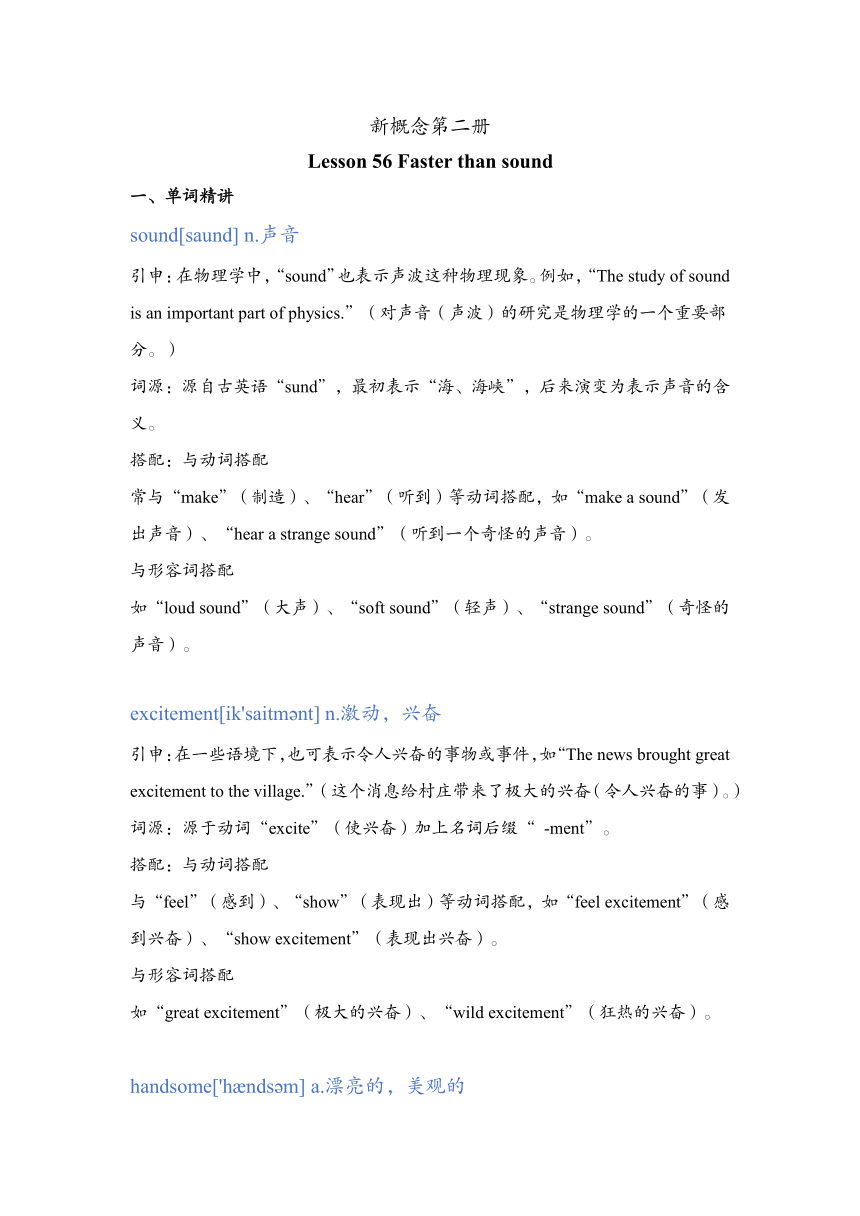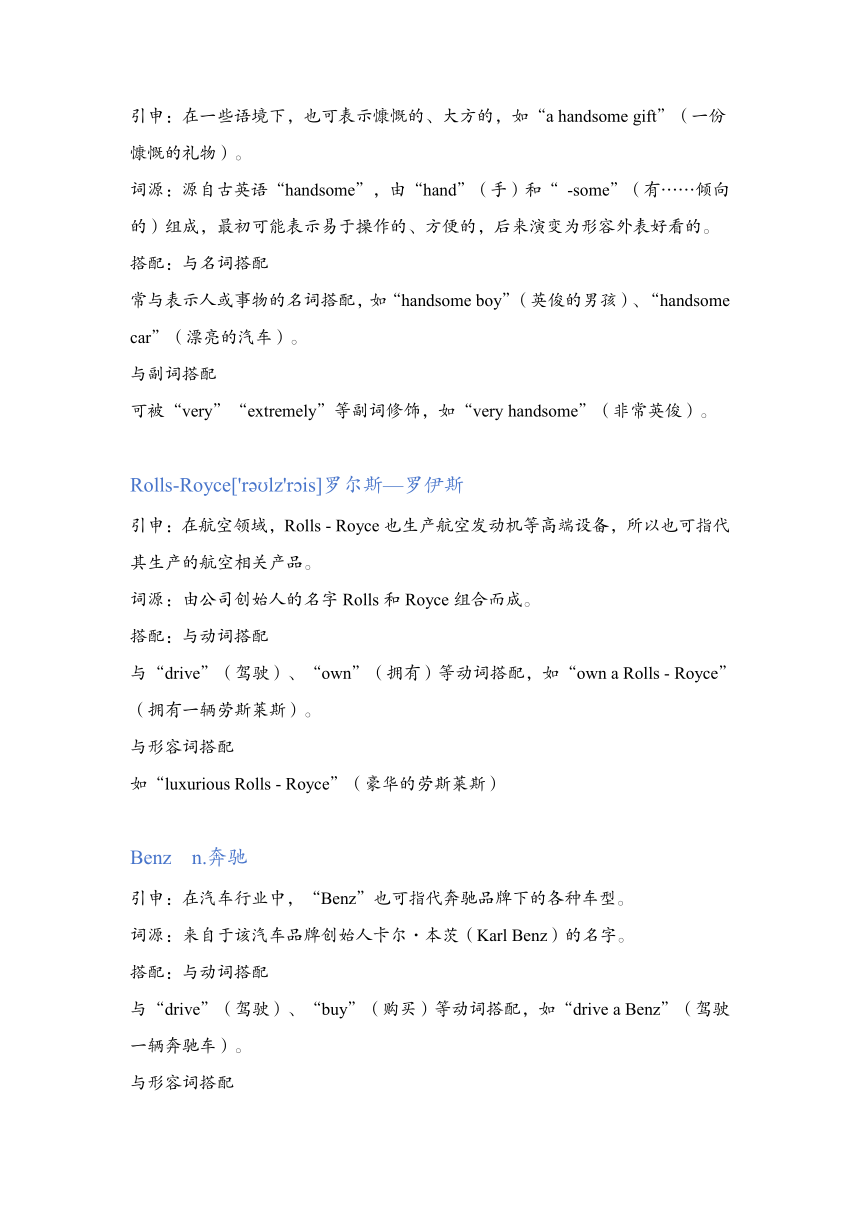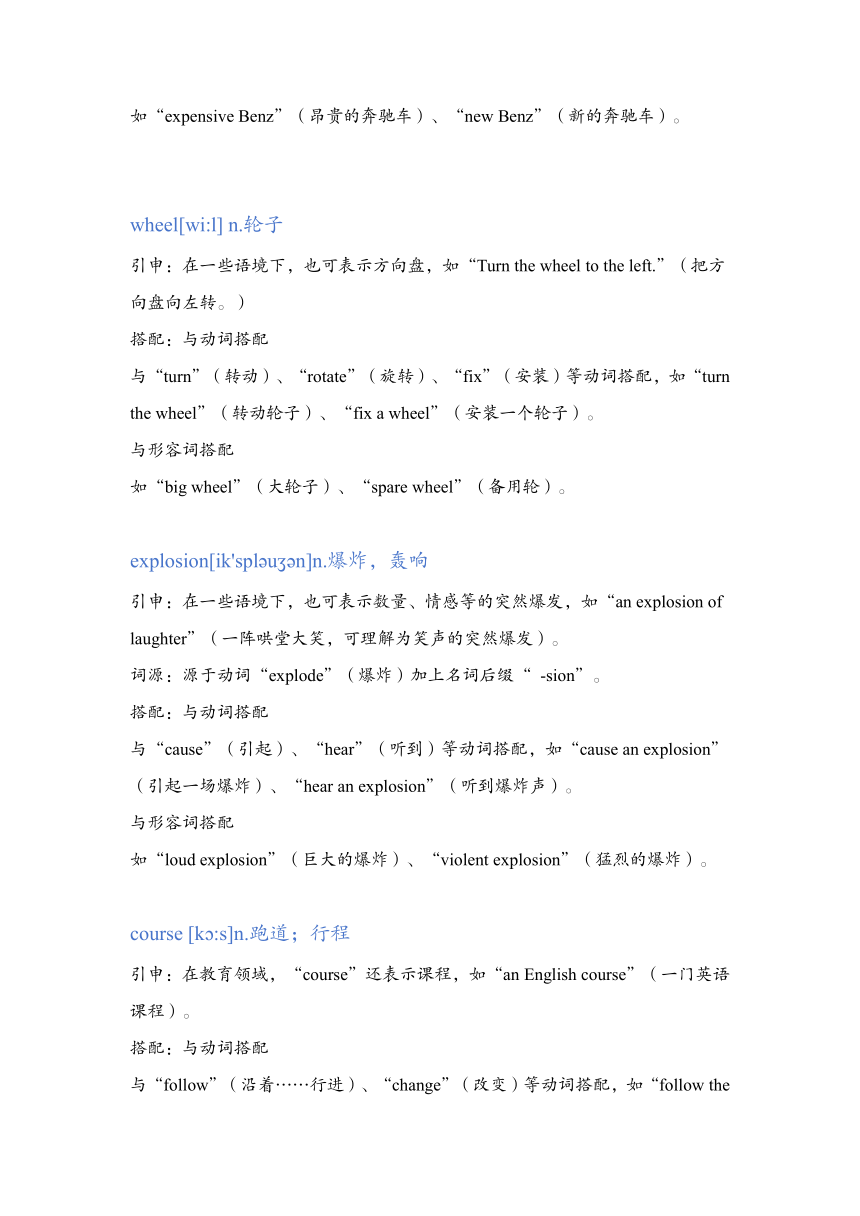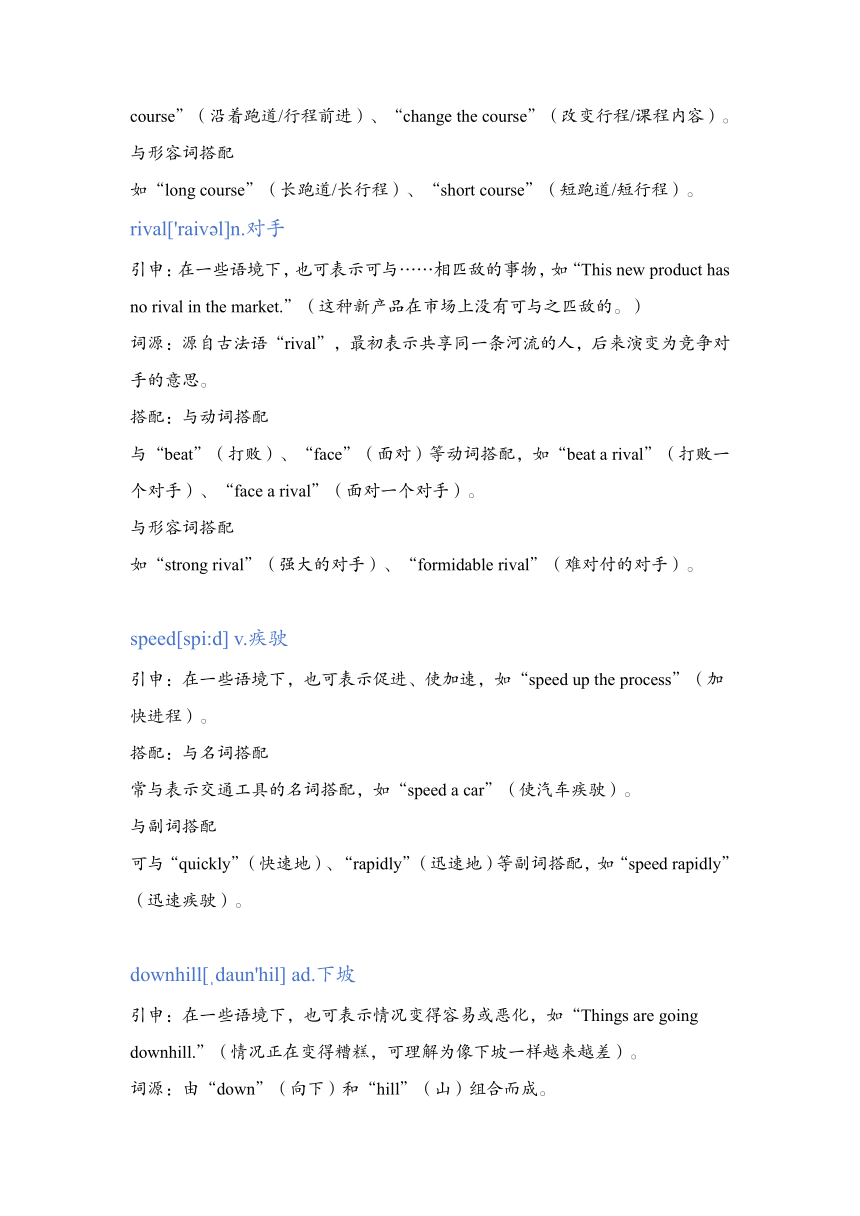新概念第二册Lesson 56 Faster than sound
文档属性
| 名称 | 新概念第二册Lesson 56 Faster than sound |  | |
| 格式 | docx | ||
| 文件大小 | 129.4KB | ||
| 资源类型 | 教案 | ||
| 版本资源 | 新概念英语 | ||
| 科目 | 英语 | ||
| 更新时间 | 2024-11-23 20:50:54 | ||
图片预览




文档简介
新概念第二册
Lesson 56 Faster than sound
单词精讲
sound[saund] n.声音
引申:在物理学中,“sound”也表示声波这种物理现象。例如,“The study of sound is an important part of physics.”(对声音(声波)的研究是物理学的一个重要部分。)
词源:源自古英语“sund”,最初表示“海、海峡”,后来演变为表示声音的含义。
搭配:与动词搭配
常与“make”(制造)、“hear”(听到)等动词搭配,如“make a sound”(发出声音)、“hear a strange sound”(听到一个奇怪的声音)。
与形容词搭配
如“loud sound”(大声)、“soft sound”(轻声)、“strange sound”(奇怪的声音)。
excitement[ik'saitm nt] n.激动,兴奋
引申:在一些语境下,也可表示令人兴奋的事物或事件,如“The news brought great excitement to the village.”(这个消息给村庄带来了极大的兴奋(令人兴奋的事)。)
词源:源于动词“excite”(使兴奋)加上名词后缀“ -ment”。
搭配:与动词搭配
与“feel”(感到)、“show”(表现出)等动词搭配,如“feel excitement”(感到兴奋)、“show excitement”(表现出兴奋)。
与形容词搭配
如“great excitement”(极大的兴奋)、“wild excitement”(狂热的兴奋)。
handsome['h nds m] a.漂亮的,美观的
引申:在一些语境下,也可表示慷慨的、大方的,如“a handsome gift”(一份慷慨的礼物)。
词源:源自古英语“handsome”,由“hand”(手)和“ -some”(有……倾向的)组成,最初可能表示易于操作的、方便的,后来演变为形容外表好看的。
搭配:与名词搭配
常与表示人或事物的名词搭配,如“handsome boy”(英俊的男孩)、“handsome car”(漂亮的汽车)。
与副词搭配
可被“very”“extremely”等副词修饰,如“very handsome”(非常英俊)。
Rolls-Royce['r lz'r is]罗尔斯—罗伊斯
引申:在航空领域,Rolls - Royce也生产航空发动机等高端设备,所以也可指代其生产的航空相关产品。
词源:由公司创始人的名字Rolls和Royce组合而成。
搭配:与动词搭配
与“drive”(驾驶)、“own”(拥有)等动词搭配,如“own a Rolls - Royce”(拥有一辆劳斯莱斯)。
与形容词搭配
如“luxurious Rolls - Royce”(豪华的劳斯莱斯)
Benz n.奔驰
引申:在汽车行业中,“Benz”也可指代奔驰品牌下的各种车型。
词源:来自于该汽车品牌创始人卡尔·本茨(Karl Benz)的名字。
搭配:与动词搭配
与“drive”(驾驶)、“buy”(购买)等动词搭配,如“drive a Benz”(驾驶一辆奔驰车)。
与形容词搭配
如“expensive Benz”(昂贵的奔驰车)、“new Benz”(新的奔驰车)。
wheel[wi:l] n.轮子
引申:在一些语境下,也可表示方向盘,如“Turn the wheel to the left.”(把方向盘向左转。)
搭配:与动词搭配
与“turn”(转动)、“rotate”(旋转)、“fix”(安装)等动词搭配,如“turn the wheel”(转动轮子)、“fix a wheel”(安装一个轮子)。
与形容词搭配
如“big wheel”(大轮子)、“spare wheel”(备用轮)。
explosion[ik'spl u n]n.爆炸,轰响
引申:在一些语境下,也可表示数量、情感等的突然爆发,如“an explosion of laughter”(一阵哄堂大笑,可理解为笑声的突然爆发)。
词源:源于动词“explode”(爆炸)加上名词后缀“ -sion”。
搭配:与动词搭配
与“cause”(引起)、“hear”(听到)等动词搭配,如“cause an explosion”(引起一场爆炸)、“hear an explosion”(听到爆炸声)。
与形容词搭配
如“loud explosion”(巨大的爆炸)、“violent explosion”(猛烈的爆炸)。
course [k :s]n.跑道;行程
引申:在教育领域,“course”还表示课程,如“an English course”(一门英语课程)。
搭配:与动词搭配
与“follow”(沿着……行进)、“change”(改变)等动词搭配,如“follow the course”(沿着跑道/行程前进)、“change the course”(改变行程/课程内容)。
与形容词搭配
如“long course”(长跑道/长行程)、“short course”(短跑道/短行程)。
rival['raiv l]n.对手
引申:在一些语境下,也可表示可与……相匹敌的事物,如“This new product has no rival in the market.”(这种新产品在市场上没有可与之匹敌的。)
词源:源自古法语“rival”,最初表示共享同一条河流的人,后来演变为竞争对手的意思。
搭配:与动词搭配
与“beat”(打败)、“face”(面对)等动词搭配,如“beat a rival”(打败一个对手)、“face a rival”(面对一个对手)。
与形容词搭配
如“strong rival”(强大的对手)、“formidable rival”(难对付的对手)。
speed[spi:d] v.疾驶
引申:在一些语境下,也可表示促进、使加速,如“speed up the process”(加快进程)。
搭配:与名词搭配
常与表示交通工具的名词搭配,如“speed a car”(使汽车疾驶)。
与副词搭配
可与“quickly”(快速地)、“rapidly”(迅速地)等副词搭配,如“speed rapidly”(迅速疾驶)。
downhill[ daun'hil] ad.下坡
引申:在一些语境下,也可表示情况变得容易或恶化,如“Things are going downhill.”(情况正在变得糟糕,可理解为像下坡一样越来越差)。
词源:由“down”(向下)和“hill”(山)组合而成。
搭配:与动词搭配
与“go”(走)、“run”(跑)、“roll”(滚动)等动词搭配,如“go downhill”(下坡走)、“roll downhill”(下坡滚动)。
与形容词搭配
在一些短语中可与形容词搭配,如“steep downhill”(陡峭的下坡路)。
重点句型
比较关系的句型
as…as 和……一样
the same (…) as 与……相同/同样
You’ve made the same mistake as Tom.
有时the same可以单独使用:
My mother is much younger than yours.
She isn’t! They’re about the same age.
Those two dress are the same.
not so…as / not as…as 不如……
different from 与……不同(different前面可加very,much,a little等修饰语)
Is French food very different from Italian food
A Frenchman could tell you better than I can!
We’re planning something different this year from what we did last year.
litte和few在口语中多用not much,not many代替:
There isn’t much sugar/aren’t many sweets, but you can have a little/few.
much和many通常用于否定句和疑问句(正式文体除外)。在日常谈话中,通常避免在肯定句中使用much和many,而用别的数量词。口语中用得最多的表示“许多”的数量词是a lot of,它既可以与复数可数名词连用也可以与不可数名词连用,后面的动词用单数还是复数取决于名词。比a lot of正式一些的表达方式有:a great/good deal of+不可数名词,a great/good/large number of+复数名词,a great/good many of+复数名词。
在what引导的感叹句中不用much/many:
What a lot of sweets Tom’s bought!
I am less lucky. 我还不如他们幸运.
more exciting 更激动 = not less exciting.
课文精讲
Once a year, a race is held for old cars. 每年都会举办一次老式汽车比赛。
=Old car race is held once a year.
once +表示时间的名词 每……一次
The postman calls once a day.
be held for 比赛为……而举行
A lot of cars entered for this race last year and there was a great deal of excitement just before it began.
去年很多汽车参加了这项比赛,就在比赛开始之前,人们非常兴奋激动。
enter for 报名参加
a great deal of +不可数名词 大量的……
There was/is a great deal of excitement. 人们非常激动
a great number of +可数名词
a great many +可数名词 许多……
a large amount of +不可数名词
just before =just 起强调作用
One of the most handsome cars was a Rolls-Royce Silver Ghost.
最漂亮的汽车之一是一辆劳斯莱斯银魅。
one of 直接作主语的时候, 它是做单数看待的
One of the answers is ture.
One of those people is good.
如果在定语从句中出现了one of作为先行词,它后边的关系代词指代的是后面的复数名词;如果在one of前面还有一修饰词only,那么后边的关系代词将指代one这个词,才作单数看
He is the only one of those rare people who believes in ancient myths.
Built in 1885, it was the oldest car taking part.
这辆车造于1885年,是参赛车辆中最古老的。
The car was built in 1885.
taking part 理解为taking part (in the race)
After a great many loud explosions, the race began.
在一阵震耳欲聋的轰鸣声之后,比赛开始了。
after explosions 许多爆炸声之后
Many of the cars broke down on the course and some drivers spent more time under their cars than in them!
许多汽车在途中抛锚了,一些司机在汽车底下花费的时间比坐在汽车里的时间还多!
many cars 许多车子;many of the cars 车子当中的许多
many students 许多学生;many of my students 我教过的许多学生
some pictures 一些照片;some of the pictures 那些照片中的一些
break down 车子抛锚,(机械等)出故障,出毛病
This morning I was late for work, because my car broke down twice.
under the car指在车下面修理;in the car指正常驾驶。句中的under和in都是斜体,英文中的斜体字起强调作用
spent more time under their cars than in them
他们花在车下的时间比在车里的时间还多
The winning car reached a speed of forty miles an hour -- much faster than any of its rivals.
获胜的汽车达到了每小时40英里的速度——比它的任何对手都要快得多。
the wining car 获胜车
a speed of +数量词 速度为……
You must have been driving at a speed of seventy miles an hour.
much faster 快得多;a little faster 快一点
any of its rivals=any rival 任何一个
any 在比较级中一旦出现, 它往往要加可数名词的单数
Beijing is bigger than any other city. (注意 “other” 不能丢)
如果是不定代词, 可以说someone else, anyone else;如果不是不定代词, 要在名词前加other.
any other competitor
It sped downhill at the end of the race and its driver had a lot of trouble trying to stop it.
at the end of… 在……的末尾/最后部分
He spoke a few words at the end of the meeting.
have trouble (in) doing sth. 干……有麻烦,做……很困难(trouble既可数又不可数)
They had some trouble finding out the cause of the fire.
它在比赛接近尾声时冲下了山坡,司机费了好大劲才把车停住。
The race gave everyone a great deal of pleasure.
这次比赛给大家带来了极大的乐趣。
give sb.+n. 给某人……
give sb. pleasure
It will give sb. a great deal of pleasure.
=There was a great deal of excitement.
give sb. a fright 吓了某人一跳
give sb. a surprise 给某人一个惊喜
It was very different from modern car races but no less exciting.
它与现代汽车比赛大不相同,但同样激动人心。
modern car race 现代车赛
be different from 和……不同
no more和no less都表示“和……一样”, 相当于only, the same
There are no more than 100 students. 这个房间仅有一百个学生。
no less exciting 一样的激动
no more than you 和你一样
表示“和……不相同”用not more= more;not less= less
not less exciting 更令人激动
Lesson 56 Faster than sound
单词精讲
sound[saund] n.声音
引申:在物理学中,“sound”也表示声波这种物理现象。例如,“The study of sound is an important part of physics.”(对声音(声波)的研究是物理学的一个重要部分。)
词源:源自古英语“sund”,最初表示“海、海峡”,后来演变为表示声音的含义。
搭配:与动词搭配
常与“make”(制造)、“hear”(听到)等动词搭配,如“make a sound”(发出声音)、“hear a strange sound”(听到一个奇怪的声音)。
与形容词搭配
如“loud sound”(大声)、“soft sound”(轻声)、“strange sound”(奇怪的声音)。
excitement[ik'saitm nt] n.激动,兴奋
引申:在一些语境下,也可表示令人兴奋的事物或事件,如“The news brought great excitement to the village.”(这个消息给村庄带来了极大的兴奋(令人兴奋的事)。)
词源:源于动词“excite”(使兴奋)加上名词后缀“ -ment”。
搭配:与动词搭配
与“feel”(感到)、“show”(表现出)等动词搭配,如“feel excitement”(感到兴奋)、“show excitement”(表现出兴奋)。
与形容词搭配
如“great excitement”(极大的兴奋)、“wild excitement”(狂热的兴奋)。
handsome['h nds m] a.漂亮的,美观的
引申:在一些语境下,也可表示慷慨的、大方的,如“a handsome gift”(一份慷慨的礼物)。
词源:源自古英语“handsome”,由“hand”(手)和“ -some”(有……倾向的)组成,最初可能表示易于操作的、方便的,后来演变为形容外表好看的。
搭配:与名词搭配
常与表示人或事物的名词搭配,如“handsome boy”(英俊的男孩)、“handsome car”(漂亮的汽车)。
与副词搭配
可被“very”“extremely”等副词修饰,如“very handsome”(非常英俊)。
Rolls-Royce['r lz'r is]罗尔斯—罗伊斯
引申:在航空领域,Rolls - Royce也生产航空发动机等高端设备,所以也可指代其生产的航空相关产品。
词源:由公司创始人的名字Rolls和Royce组合而成。
搭配:与动词搭配
与“drive”(驾驶)、“own”(拥有)等动词搭配,如“own a Rolls - Royce”(拥有一辆劳斯莱斯)。
与形容词搭配
如“luxurious Rolls - Royce”(豪华的劳斯莱斯)
Benz n.奔驰
引申:在汽车行业中,“Benz”也可指代奔驰品牌下的各种车型。
词源:来自于该汽车品牌创始人卡尔·本茨(Karl Benz)的名字。
搭配:与动词搭配
与“drive”(驾驶)、“buy”(购买)等动词搭配,如“drive a Benz”(驾驶一辆奔驰车)。
与形容词搭配
如“expensive Benz”(昂贵的奔驰车)、“new Benz”(新的奔驰车)。
wheel[wi:l] n.轮子
引申:在一些语境下,也可表示方向盘,如“Turn the wheel to the left.”(把方向盘向左转。)
搭配:与动词搭配
与“turn”(转动)、“rotate”(旋转)、“fix”(安装)等动词搭配,如“turn the wheel”(转动轮子)、“fix a wheel”(安装一个轮子)。
与形容词搭配
如“big wheel”(大轮子)、“spare wheel”(备用轮)。
explosion[ik'spl u n]n.爆炸,轰响
引申:在一些语境下,也可表示数量、情感等的突然爆发,如“an explosion of laughter”(一阵哄堂大笑,可理解为笑声的突然爆发)。
词源:源于动词“explode”(爆炸)加上名词后缀“ -sion”。
搭配:与动词搭配
与“cause”(引起)、“hear”(听到)等动词搭配,如“cause an explosion”(引起一场爆炸)、“hear an explosion”(听到爆炸声)。
与形容词搭配
如“loud explosion”(巨大的爆炸)、“violent explosion”(猛烈的爆炸)。
course [k :s]n.跑道;行程
引申:在教育领域,“course”还表示课程,如“an English course”(一门英语课程)。
搭配:与动词搭配
与“follow”(沿着……行进)、“change”(改变)等动词搭配,如“follow the course”(沿着跑道/行程前进)、“change the course”(改变行程/课程内容)。
与形容词搭配
如“long course”(长跑道/长行程)、“short course”(短跑道/短行程)。
rival['raiv l]n.对手
引申:在一些语境下,也可表示可与……相匹敌的事物,如“This new product has no rival in the market.”(这种新产品在市场上没有可与之匹敌的。)
词源:源自古法语“rival”,最初表示共享同一条河流的人,后来演变为竞争对手的意思。
搭配:与动词搭配
与“beat”(打败)、“face”(面对)等动词搭配,如“beat a rival”(打败一个对手)、“face a rival”(面对一个对手)。
与形容词搭配
如“strong rival”(强大的对手)、“formidable rival”(难对付的对手)。
speed[spi:d] v.疾驶
引申:在一些语境下,也可表示促进、使加速,如“speed up the process”(加快进程)。
搭配:与名词搭配
常与表示交通工具的名词搭配,如“speed a car”(使汽车疾驶)。
与副词搭配
可与“quickly”(快速地)、“rapidly”(迅速地)等副词搭配,如“speed rapidly”(迅速疾驶)。
downhill[ daun'hil] ad.下坡
引申:在一些语境下,也可表示情况变得容易或恶化,如“Things are going downhill.”(情况正在变得糟糕,可理解为像下坡一样越来越差)。
词源:由“down”(向下)和“hill”(山)组合而成。
搭配:与动词搭配
与“go”(走)、“run”(跑)、“roll”(滚动)等动词搭配,如“go downhill”(下坡走)、“roll downhill”(下坡滚动)。
与形容词搭配
在一些短语中可与形容词搭配,如“steep downhill”(陡峭的下坡路)。
重点句型
比较关系的句型
as…as 和……一样
the same (…) as 与……相同/同样
You’ve made the same mistake as Tom.
有时the same可以单独使用:
My mother is much younger than yours.
She isn’t! They’re about the same age.
Those two dress are the same.
not so…as / not as…as 不如……
different from 与……不同(different前面可加very,much,a little等修饰语)
Is French food very different from Italian food
A Frenchman could tell you better than I can!
We’re planning something different this year from what we did last year.
litte和few在口语中多用not much,not many代替:
There isn’t much sugar/aren’t many sweets, but you can have a little/few.
much和many通常用于否定句和疑问句(正式文体除外)。在日常谈话中,通常避免在肯定句中使用much和many,而用别的数量词。口语中用得最多的表示“许多”的数量词是a lot of,它既可以与复数可数名词连用也可以与不可数名词连用,后面的动词用单数还是复数取决于名词。比a lot of正式一些的表达方式有:a great/good deal of+不可数名词,a great/good/large number of+复数名词,a great/good many of+复数名词。
在what引导的感叹句中不用much/many:
What a lot of sweets Tom’s bought!
I am less lucky. 我还不如他们幸运.
more exciting 更激动 = not less exciting.
课文精讲
Once a year, a race is held for old cars. 每年都会举办一次老式汽车比赛。
=Old car race is held once a year.
once +表示时间的名词 每……一次
The postman calls once a day.
be held for 比赛为……而举行
A lot of cars entered for this race last year and there was a great deal of excitement just before it began.
去年很多汽车参加了这项比赛,就在比赛开始之前,人们非常兴奋激动。
enter for 报名参加
a great deal of +不可数名词 大量的……
There was/is a great deal of excitement. 人们非常激动
a great number of +可数名词
a great many +可数名词 许多……
a large amount of +不可数名词
just before =just 起强调作用
One of the most handsome cars was a Rolls-Royce Silver Ghost.
最漂亮的汽车之一是一辆劳斯莱斯银魅。
one of 直接作主语的时候, 它是做单数看待的
One of the answers is ture.
One of those people is good.
如果在定语从句中出现了one of作为先行词,它后边的关系代词指代的是后面的复数名词;如果在one of前面还有一修饰词only,那么后边的关系代词将指代one这个词,才作单数看
He is the only one of those rare people who believes in ancient myths.
Built in 1885, it was the oldest car taking part.
这辆车造于1885年,是参赛车辆中最古老的。
The car was built in 1885.
taking part 理解为taking part (in the race)
After a great many loud explosions, the race began.
在一阵震耳欲聋的轰鸣声之后,比赛开始了。
after explosions 许多爆炸声之后
Many of the cars broke down on the course and some drivers spent more time under their cars than in them!
许多汽车在途中抛锚了,一些司机在汽车底下花费的时间比坐在汽车里的时间还多!
many cars 许多车子;many of the cars 车子当中的许多
many students 许多学生;many of my students 我教过的许多学生
some pictures 一些照片;some of the pictures 那些照片中的一些
break down 车子抛锚,(机械等)出故障,出毛病
This morning I was late for work, because my car broke down twice.
under the car指在车下面修理;in the car指正常驾驶。句中的under和in都是斜体,英文中的斜体字起强调作用
spent more time under their cars than in them
他们花在车下的时间比在车里的时间还多
The winning car reached a speed of forty miles an hour -- much faster than any of its rivals.
获胜的汽车达到了每小时40英里的速度——比它的任何对手都要快得多。
the wining car 获胜车
a speed of +数量词 速度为……
You must have been driving at a speed of seventy miles an hour.
much faster 快得多;a little faster 快一点
any of its rivals=any rival 任何一个
any 在比较级中一旦出现, 它往往要加可数名词的单数
Beijing is bigger than any other city. (注意 “other” 不能丢)
如果是不定代词, 可以说someone else, anyone else;如果不是不定代词, 要在名词前加other.
any other competitor
It sped downhill at the end of the race and its driver had a lot of trouble trying to stop it.
at the end of… 在……的末尾/最后部分
He spoke a few words at the end of the meeting.
have trouble (in) doing sth. 干……有麻烦,做……很困难(trouble既可数又不可数)
They had some trouble finding out the cause of the fire.
它在比赛接近尾声时冲下了山坡,司机费了好大劲才把车停住。
The race gave everyone a great deal of pleasure.
这次比赛给大家带来了极大的乐趣。
give sb.+n. 给某人……
give sb. pleasure
It will give sb. a great deal of pleasure.
=There was a great deal of excitement.
give sb. a fright 吓了某人一跳
give sb. a surprise 给某人一个惊喜
It was very different from modern car races but no less exciting.
它与现代汽车比赛大不相同,但同样激动人心。
modern car race 现代车赛
be different from 和……不同
no more和no less都表示“和……一样”, 相当于only, the same
There are no more than 100 students. 这个房间仅有一百个学生。
no less exciting 一样的激动
no more than you 和你一样
表示“和……不相同”用not more= more;not less= less
not less exciting 更令人激动
同课章节目录
